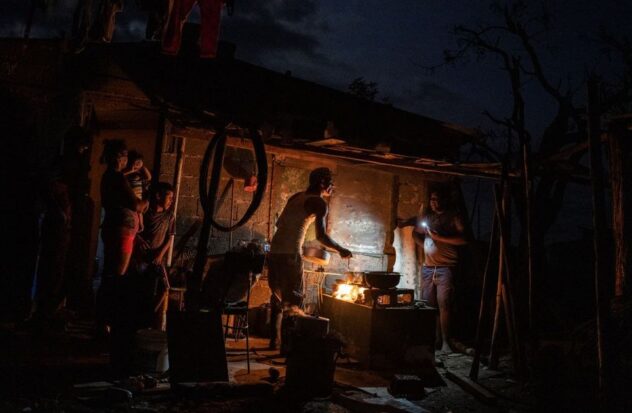HAVANA.- Los blackouts have become an unavoidable part of daily life in Cubaaffecting both the capital and the inland provinces. However, the frequency and impact of these outages vary considerably between the two areas, creating an uneven experience for the island’s inhabitants.
According to review Cuba DiaryZenia, a 46-year-old housewife, recounts her experience in the José Martí District during a nighttime blackout on July 12: “The entire neighborhood was sitting outside. You can’t stand being stuck in that dark box, at least outside there’s a breeze from time to time and you have the moonlight, although that day everyone was carrying water. They haven’t put it on for more than 15 days, so that was the entertainment of the blackout.”
In the Cuban summer, temperatures can exceed 38 degrees, making the situation worse. Despite government efforts to keep thermoelectric plants operating during the holiday period, the designated president, Miguel Díaz-Canel, anticipated in his podcast “Desde la Presidencia” that the blackouts would continue. “What everyone can be sure of is that there are no blackouts here caused to bother anyone,” he said in the broadcast on May 23.
Alfredo López Valdés, director of the Cuban Electric Union (UNE), explained in the same podcast that “we have a limit of energy to generate, we don’t have any more. How can we solve it if the demand is higher? By saving.” He also admitted that the real solution involves a significant investment in new thermoelectric plants, highlighting that “the electrical system takes about 300 million dollars annually and we have not had that amount in recent years.”
The situation is particularly serious in the interior provinces, where blackouts are more frequent and longer. In the town of Velasco, Holguín province, residents report blackouts of six hours a day, twice a day. An anonymous source commented that “the blackouts” are used to carry out essential tasks such as banking transactions and the use of household appliances. “Being in a blackout is the norm here,” he concluded.
The nighttime blackouts are especially hard on the population. Yanis, 24, a resident of Santiago de Cuba, explains how they affect families: “You don’t sleep until the power comes on. The children fall asleep and we leave them on our legs, blowing air into them with cardboard, or we put them on a mat on the floor of the balcony. You can’t put them to bed in a crib or bed with a mosquito net; they would suffocate from the heat and you can’t leave them without a mosquito net either, now there’s the oropouche.”
The elderly are also suffering considerably from the crisis. Zoila and Josefina, sisters aged 77 and 81 respectively, describe their odyssey to collect their pension. “We take turns at dawn and, of the four times we have gone, they have cut off the power twice. They cut it off at seven in the morning for three hours. We stay until the power comes on. When it comes on, we have to wait for the connection and then for them to bring cash. We come out around two in the afternoon, fainting from hunger, but we get paid. They took our checkbook away, gave us cards and we have to collect at the till,” says Zoila.
The situation of the National Electric System (SEN) has deteriorated since July 18, with massive blackouts from Matanzas to Guantanamo due to breakdowns, fuel shortages and insufficient generation capacity. Dafne, 51, comments on the impact on her daily life in Santiago de Cuba: “Yesterday the power outage here in Santiago was terrible. They cut it off at nine in the morning until one in the afternoon and they cut it off at 9:45 at night until 12 at night, and from two until seven in the morning.”
Meanwhile, Cuban citizens are trying to adapt to this new normal, facing precarious lives under stifling heat and with little hope of imminent change.
Source: With information from Diario de Cuba

